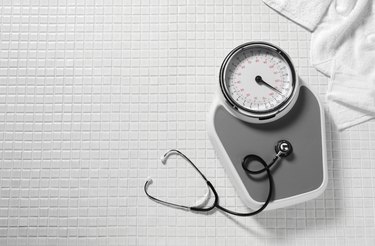
When used as prescribed, Ritalin is a safe medication that can help treat symptoms of attention deficit hyperactivity disorder and narcolepsy. It has also been used illegally for weight loss -- stimulants have a long history as weight loss aids, and some people are attracted to the fact that Ritalin is a stronger stimulant than caffeine. This is a fool's game. Not only does using Ritalin for weight loss qualify as drug abuse, but you put your health at tremendous risk, possibly ending up further from your goal than where you started.
Ritalin
Video of the Day
On the stimulant scale, Ritalin falls between caffeine and amphetamines. It stimulates the central nervous system by initiating brain stem activity and arousing neurotransmitters in the brain -- like caffeine, it produces a fight or flight response, but the controlled-release tablets allow your body to experience a "slow-burn" type of reaction to avoid a peak-and crash situation. In people with ADHD, this stimulation helps them focus and sit still. But people who use Ritalin without a doctor's supervision risk dangerous side effects.
Video of the Day
Illicit Use
Weight loss is a possible side effect with Ritalin. The drug is not prescribed for this purpose, not even off-label, so people who wish to use it as a weight loss drug must buy it illegally -- Ritalin is a Schedule II Controlled Substance, and possessing it without a prescription is a crime. The illegality is the least of the concerns, though -- illicit Ritalin users generally use the drug at higher doses than prescribed in order to ensure the weight loss effect, and they use it in ways other than it was intended. Some crush the pill and snort the powder, and others mix the crushed pill with water and inject it. Both methods destroy the controlled-release action of the pill, greatly increasing the risk of dangerous side effects.
Dangers
The immediate effects of Ritalin are similar to cocaine, because both drugs work on the same parts of the brain. You may experience nervousness, vomiting, nausea and an accelerated heart rate, and high doses can cause psychotic episodes, skin rash and digestive problems. Over time, your body builds up a tolerance to the drug, and you have to take more of it to keep losing weight. This puts you at risk of developing tremors, severe headaches, paranoia, hallucinations and convulsions. Eventually, you would have to increase your dose to the point of overdose to experience the same weight loss -- in which case, you may shake uncontrollably, vomit, get a fever and a severe headache, and eventually lose consciousness according to PubMed Health.
Weight Loss
When you stop taking Ritalin, any weight you lost on the drug will come right back, with a little extra. The stimulant properties of the drug make your body burn more calories, and the side effects like nausea, vomiting and diarrhea make you lose your appetite -- that's where the weight loss comes from. Once you're off the drug, your appetite returns, but your body doesn't burn as many calories without the stimulant. In the end, you may end up heavier than you were to begin with, and you may be left with permanent physical consequences.